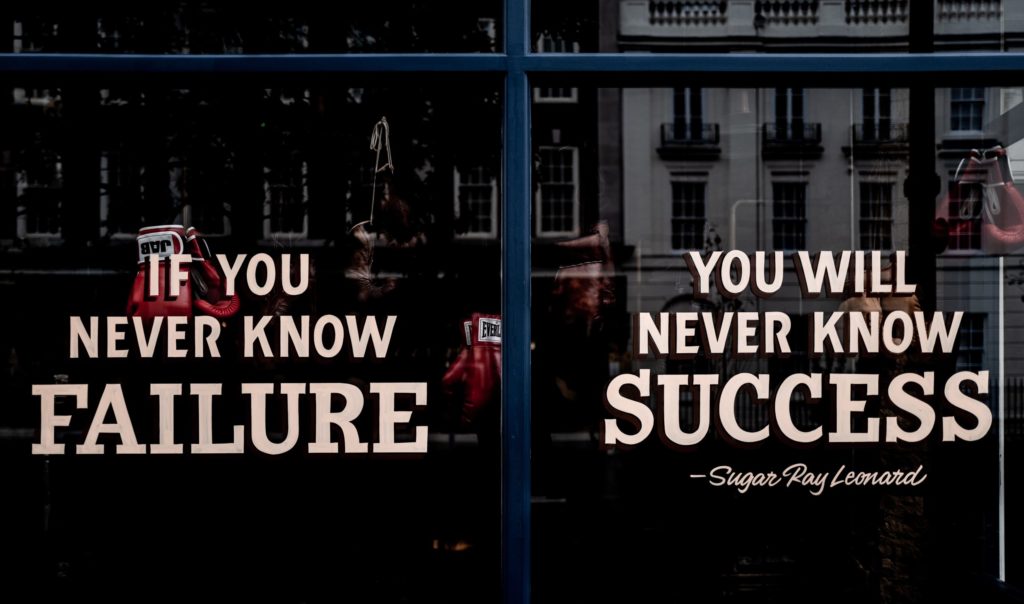Redefining Failure and Success

Fear and failure seem to be the ultimate pairing, kind of like peanut butter and jelly. When athletes talk about fear in my office 99 percent of the time their fears are rooted in some perceived failure. I identify it as a perceived failure because each person has creatively written their own narrative about what constitutes success and failure. Usually, failure sounds like “DNF-ing (Did Not Finish), injury, not winning, hitting intervals slower than intended, needing to call a workout short and walk home or missing a workout.” I like to point out that “failure” sounds a lot like perfectionism. Redefining failure and success can help us grow and get better without the stress of failing.
When we look at success and failure through a binary lens, we set ourselves up for a wild rollercoaster ride of emotions. This happens because we think of failure as a bad thing and with that comes an unintentional connection to our self-worth and ability. I find this way of thinking tragic for two reasons, firstly because your worth and ability have nothing to do with if you “fail.” Secondly, because the only way to find your true potential as an athlete is to go out and fail. In fact, if you are not failing regularly as an athlete then you are doing something wrong.
The key here is not to not fail, but to change how we think about success and progress, so that we have less of an emotional response and self-defeating spiral. By redefining failure and success we are able to get a clearer picture of our ability and what to work towards.
I like to think of failure as data points for a specific moment in time. They can provide information, but don’t give the whole picture. Maybe you DNF a race, that result doesn’t accurately depict your fitness but depicts your circumstances on that specific day. Maybe, you had a stressful work week and that impacted your race. You could come back two weeks later and have a breakthrough performance. It’s not that your fitness dramatically improved in those two weeks, just that life, fitness, and opportunity all fell in line. The point is that life and athletics are messy, unpredictable, and no one moment gives us an accurate depiction of who we are or what we are capable of. To figure that out we have to take chances, fail, and try again. Rinse and repeat until the day we die.
Having the strength to get back up and try again takes changing our perspective on failure. We have to view it as a friend that helps us, not the bully that beats us down. To do this it’s important to look at the benefits that failure provides.
ADVERTISEMENT

Helps us to Learn from our Mistakes and Improve for Next Time
Maybe you went for a long workout and didn’t bring enough fuel, you bonk and need to walk back. Instead of thinking you’re terrible or you’ll never be able to finish your race, assess what went wrong and make adjustments. You ran out of fuel so next time pack more, buy a vest to carry more with you, or find a different fuel that works better.
Builds our Resilience
Falling short of our goals helps teach us how to get back up and keep moving forward. This resilience is imperative for life-long athletics because injuries, setbacks, and disappointments will always be part of the journey. If we don’t learn how to handle them and accept them as part of the process then quitting will be inevitable.
Creates Opportunities
When we think of everything as an opportunity to grow then no circumstance can pull us away from our goals. Instead of getting down about a difficult workout, consider thinking about it as an opportunity to work on positive self-talk during rough patches that will later serve you during a race.
Makes us More Courageous
Fail enough and that fear monster starts to shrink as you realize all those terrible things you thought were going to happen didn’t happen. So, you finished outside of where you thought you were “supposed to,” but everyone still loves you, and the next day people are more concerned with what’s for lunch than your race results.
Encourages Problem Solving
Instead of panicking when we feel ourselves falling short, we can reframe the situation by asking “what do I need right now?” An example could be struggling in a race with the uphills. Instead of trying to force yourself to perform at your perceived potential, you could switch your race plan to power hiking the uphills till the next aid station where you could refuel and hydrate then see how you feel.
In college, we had to create a “Hero’s Journey” for a project. Basically, we depicted the lows and highs of our journeys toward something meaningful. For three days I cried, laughed, and celebrated the messiness of life and the beauty of stories that make us who we are. I say this because your failures are part of your beauty, part of your story, and they make this whole athletic thing vibrant, exciting, and meaningful. Your best days are only as big of a celebration as your most epic failures and your most epic failures are the foundation for your biggest breakthroughs. If you learn to embrace failure as a friend there is nothing that can stop you.
ADVERTISEMENT

Haleigh Fisher is a Licensed Professional Counselor working with athletes to help them train and live happy by helping them develop mental skills and embrace their strengths. She is a former Division I cross country athlete turned trail runner and uses her experience as a competitive athlete and mental health clinician to connect with clients and help them unlock their potential. Haleigh describes herself as a joy seeker, a trail running adventurer, a celebrator of food, an artist, and a lover of people; thrift shopping; and cupcakes.








